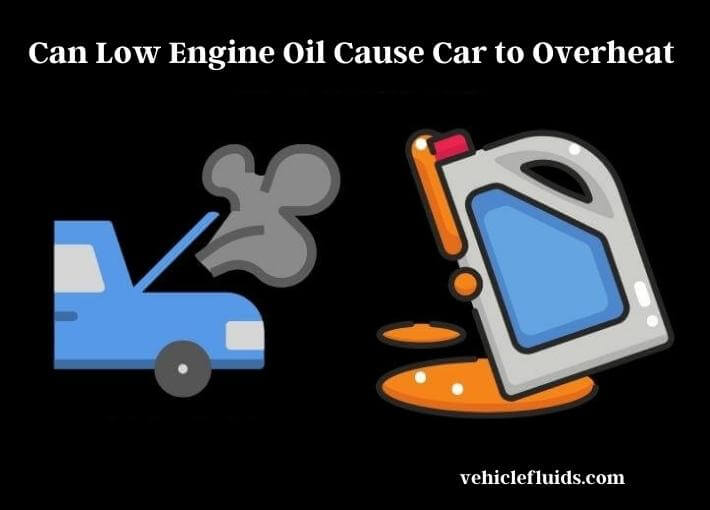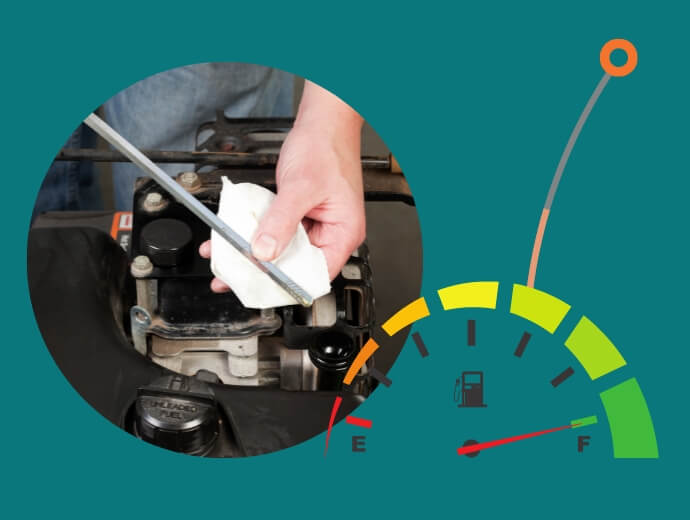This is a common question posed by car owners, and the answer is yes, low engine oil can cause a car to overheat. When the engine oil gets too low, the heat generated by the engine is not properly dissipated, leading to an increase in temperature.

This is especially true for older vehicles, as the cooling system may not be able to keep up with the increased heat. In some cases, the engine may even seize up from the high temperature. To avoid this, it is important to check the engine oil regularly and to top it off as necessary.
It is important to ensure that the cooling system is functioning properly, as a malfunctioning cooling system can further contribute to engine overheating. Taking care of your vehicle’s engine oil and cooling system can save you from costly repairs and help keep your car running smoothly.
Definition of Engine Oil and Its Importance
Engine oil is a lubricant used in internal combustion engines to reduce friction and wear between moving parts. It also helps to clean, cool, and seal engine components, and prevent corrosion.
The importance of engine oil lies in its role in maintaining the overall health of an engine. Proper lubrication of engine parts reduces friction and wear, prolonging the lifespan of the engine. Engine oil also helps to remove contaminants and prevent the buildup of harmful deposits, keeping the engine running smoothly and efficiently. Regular oil changes are necessary to ensure the engine continues to receive the necessary protection and performance benefits.
How Low Engine Oil Can Cause a Car to Overheat?
Low engine oil levels can cause a car to overheat because oil is crucial for lubricating the engine’s internal parts. When there’s not enough oil, the parts start to rub against each other, creating friction and heat. This increased heat can cause the engine to overheat, potentially leading to permanent damage if not addressed promptly.
Low oil levels can also mean that the oil pump is not functioning properly, which can also lead to overheating. To avoid this, it’s important to regularly check your oil levels and top off as needed.
Engine Oil and What Does It Do?
Engine oil is a lubricant used to reduce friction and wear between moving parts in an internal combustion engine. It is designed to provide protection to the engine components, maintain engine cleanliness, and prevent corrosion.
Engine oil is formulated with base oils and a combination of additives to enhance its performance and provide additional benefits such as increased viscosity, improved thermal stability, and better wear protection.
Engine Oils Function in the Engine
As a language model AI, I do not have personal experience but here is a description:
Engine oil plays a crucial role in the functioning of an engine. It serves several key functions:
Lubrication
Engine oil provides a thin layer of lubrication between the moving parts of the engine, reducing friction and wear. This helps to prevent damage to the engine and prolong its lifespan.
Cooling
Engine oil also helps to absorb and dissipate heat generated by the engine, keeping it cool and running efficiently.
Cleaning
Engine oil contains detergents and dispersants that help to keep the engine clean by removing dirt, debris, and deposits.
Sealing
Engine oil also helps to maintain proper engine compression by providing a seal between the pistons and cylinder walls.
Protecting
Engine oil also helps to protect against corrosion and rust, and provides protection against rust, corrosion, and chemical degradation.
Engine oil is essential for the proper functioning of an engine, and helps to keep it running smoothly and efficiently for years to come.
How to Detect Low Engine Oil Levels?
To detect low engine oil levels, you can check the oil level gauge on the vehicle’s dashboard, or dipstick. You can look for warning lights or warning messages displayed on the vehicle’s instrument panel.

You may also notice unusual engine noises or increased engine wear if the oil level is low. It’s important to regularly check the engine oil level and maintain it at the proper level to ensure the smooth operation of your vehicle.
Warning Signs That Indicate Low Engine Oil Levels
Low engine oil levels can cause significant damage to the engine and lead to expensive repairs. Here are some warning signs that indicate low oil levels:
Engine Warning Light
The “check engine” or “low oil level” warning light will illuminate the dashboard if the oil level is too low.
Engine Knocking or Ticking Noise
When the oil level is low, the engine components can rub against each other, causing a knocking or ticking noise.
Engine Misfire
Low oil levels can cause the engine to misfire, leading to decreased performance and power.
Oil Pressure Warning Light
The oil pressure warning light may come on if the oil level is low, as the oil pump requires a certain amount of oil to function properly.
Decreased Fuel Efficiency
When the engine is low on oil, it has to work harder, leading to decreased fuel efficiency.
It is important to regularly check the oil level in your engine and top it up if necessary to maintain proper lubrication and prevent damage.
The Importance of Regularly Checking Engine Oil Levels to Prevent Overheating
Regularly checking engine oil levels is essential in order to prevent overheating. The engine oil acts as a lubricant for the engine components and helps to reduce friction, which can generate excessive heat. When the oil levels are low, the engine is more likely to overheat as there is not enough lubrication to reduce friction.
Furthermore, the oil also absorbs heat from the engine components, which helps to keep the engine cool. If the oil levels are low, the engine will not be able to efficiently absorb the heat and the engine temperature will increase. Regularly checking the oil levels will ensure that the engine is properly lubricated and cooled, thereby preventing overheating.
Regularly checking the oil levels can also help to detect any issues with the engine components, such as leaks or worn parts, which can further increase the risk of overheating.
What to Do if Your Car Overheats?
If your car overheats, the first thing you should do is turn off the air conditioning and turn on the heat full blast. This will help draw heat away from the engine. Then, pull over and turn the engine off. If you can, open the hood and check the coolant level in the radiator. If it’s low, add coolant as necessary.
If the coolant looks to be at normal levels, you may need to wait for the engine to cool down before you can safely continue driving. If it’s not cooling down, you may need to call a tow truck to take it to a mechanic. If you’re stuck in traffic, try to find a place where you can pull over and wait for the engine to cool down.
Importance of Taking Immediate Action to Prevent Damage to the Engine
Taking immediate action to prevent damage to an engine is important for many reasons. Immediate action can help reduce the need for costly repairs, prevent further damage to the engine, and allow the vehicle to continue running smoothly.
It also helps to identify and address any underlying issues that may be causing the problem, ensuring that the engine remains in good condition for the long term.
The Role of Engine Oil in Overheating and Its Potential to Cause Damage
Engine oil plays a vital role in keeping your engine running smoothly and helping to prevent it from overheating. When the engine oil breaks down or becomes contaminated, it can cause the engine to overheat.
If the engine is not properly lubricated, the heat from friction between the moving parts can cause extreme temperatures. This can lead to serious damage to the engine, including warping or cracking of the engine block, cylinder head, and pistons. It can also cause damage to the bearings and other components of the engine.
To prevent overheating and potential damage, it is important to regularly change the oil and filter and to maintain the oil level according to the manufacturer’s specifications.
Conclusion
It is possible for low engine oil to cause a car to overheat. Low oil levels can reduce the efficiency of the engine, leading to increased friction between components, and resulting in higher temperatures.
Low oil levels can reduce the amount of lubrication between components, leading to further wear and tear and increased temperatures. It is important to check oil levels regularly and top up as necessary to ensure optimal engine performance and prevent overheating.
The Importance of Regular Engine Oil Checks to Prevent Overheating
Regular engine oil checks are important to prevent overheating because oil is essential for lubrication, cooling, and cleaning of the engine. It helps reduce friction between moving parts and ensures that the engine runs smoothly and efficiently. When the oil level is low, it can cause the engine to overheat and lead to serious engine damage.
Regular oil checks can help detect any issues with the oil level or quality before they become a problem. Checking the oil level and quality on a regular basis will help keep the engine running at its optimal temperature and help prevent overheating.
Final Thoughts
Engine oil plays an important role in the proper functioning of an engine and is essential to ensuring that the engine remains cool. Without the right amount of engine oil, the engine may overheat, leading to serious problems.
Therefore, it is important to ensure that your car has the right type and amount of oil for optimal performance and to avoid overheating.
FAQs
Can Needing an Oil Change Cause Your Car to Overheat?
No, needing an oil change will not cause your car to overheat. Overheating can be caused by a variety of things including a faulty radiator, low coolant levels, a blocked radiator, a faulty thermostat, or a faulty water pump.
It’s important to know that if you have ever been driving down the street and suddenly your car starts to jerk, shake, or stall, it could be an indication that you need an oil change.
What Happens if I Drive With Low Engine Oil?
Driving with low engine oil can cause severe damage to your engine, such as increased wear and tear on the internal components, and even irreparable damage. Low engine oil can cause the engine to overheat, which can lead to a loss of power, smoke, and even the possibility of a complete engine failure.
Is It Safe to Drive My Car if It is Overheating?
No, it is not safe to drive your car if it is overheating. If your car is overheating, pull over and turn off the engine immediately. You should allow the engine to cool down before attempting to continue driving.
Can Low Oil Overheat Your Car?
Yes, low oil levels can cause your car to overheat. When the oil level is low, it can’t lubricate the engine parts properly, causing them to rub against each other and generate more heat than usual. This extra heat can cause the engine to overheat.
References:
